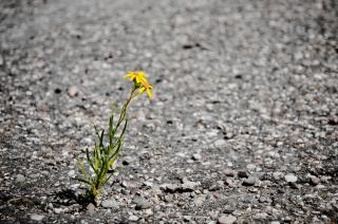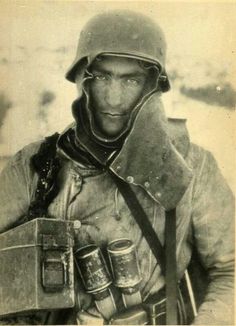Somewhere in the future, a child finds a thing
Brings it to its grandpa and asks what it is
And he smiles, looks down sadly and tries to explain
»It’s a flower. We had plenty, but today there are no more.«
Back in the days when we all had a chance and we blew it
Fighting each other in a War, which was wrong and we knew it
We should have said: »No! No! No! No! No! We don’t do it!«
The child is wondering how this all could happen to the world
So it asks the grandpa for the reason of it all
And he nods, looks up angry and starts to explain:
»Greedy people with much power lead us all into the end.«
Back in the days when we all had a chance and we blew it
Fighting each other in a War, which was wrong and we knew it
We should have said: »No! No! No! No! No! We don’t do it!«
And the child takes the flower and plants it in the ground
It shall grow, become a symbol until more of it will be found
Back in the days when we all had a chance and we blew it
Fighting each other in a War, which was wrong and we knew it
We should have said: »No! No! No! No! No! We don’t do it!«
Brings it to its grandpa and asks what it is
And he smiles, looks down sadly and tries to explain
»It’s a flower. We had plenty, but today there are no more.«
Back in the days when we all had a chance and we blew it
Fighting each other in a War, which was wrong and we knew it
We should have said: »No! No! No! No! No! We don’t do it!«
The child is wondering how this all could happen to the world
So it asks the grandpa for the reason of it all
And he nods, looks up angry and starts to explain:
»Greedy people with much power lead us all into the end.«
Back in the days when we all had a chance and we blew it
Fighting each other in a War, which was wrong and we knew it
We should have said: »No! No! No! No! No! We don’t do it!«
And the child takes the flower and plants it in the ground
It shall grow, become a symbol until more of it will be found
Back in the days when we all had a chance and we blew it
Fighting each other in a War, which was wrong and we knew it
We should have said: »No! No! No! No! No! We don’t do it!«
Contributed by Juha Rämö - 2018/11/12 - 11:47
Language: German
Traduzione tedesca / German translation / Traduction allemande / Deutsche Übersetzung / Saksankielinen käännös: Marco Buono
Dieses Lied gewann den vierten Preis beim deutschen Friedenssong-Wettbewerb 2018.
Hier kann man sich das Lied anhören.

Dieses Lied gewann den vierten Preis beim deutschen Friedenssong-Wettbewerb 2018.
Hier kann man sich das Lied anhören.

DAMALS (DIE BLUME)
Irgendwo in der Zukunft findet ein Kind ein Ding,
bringt es zu seinem Großvater und fragt was es ist.
Und er lächelt, schaut traurig nach unten und versucht zu erklären:
»Es ist eine Blume. Wir hatten einige, aber heute gibt es keine mehr.«
Damals, als wir alle eine Chance hatten und es vermasselt haben,
bekämpften uns alle in einem Krieg, der falsch war und wir wussten es.
Wir hätten sagen sollen: »Nein! Nein! Nein! Nein! Nein! Wir tun das nicht!«
Das Kind wundert sich wie das alles der Welt passieren konnte.
So fragt es den Großvater nach dem Grund für das alles.
Und er nickt, schaut verärgert auf und beginnt zu erklären:
»Gierige Leute mit viel Macht führten uns alle in das Ende.«
Damals, als wir alle eine Chance hatten und es vermasselt haben,
bekämpften uns alle in einem Krieg, der falsch war und wir wussten es.
Wir hätten sagen sollen: »Nein! Nein! Nein! Nein! Nein! Wir tun das nicht!«
Und das Kind nimmt die Blume und pflanzt sie in den Boden.
Sie soll wachsen, ein Symbol werden, bis mehr davon gefunden werden.
Damals, als wir alle eine Chance hatten und es vermasselt haben,
bekämpften uns alle in einem Krieg, der falsch war und wir wussten es.
Wir hätten sagen sollen: »Nein! Nein! Nein! Nein! Nein! Wir tun das nicht!«
Irgendwo in der Zukunft findet ein Kind ein Ding,
bringt es zu seinem Großvater und fragt was es ist.
Und er lächelt, schaut traurig nach unten und versucht zu erklären:
»Es ist eine Blume. Wir hatten einige, aber heute gibt es keine mehr.«
Damals, als wir alle eine Chance hatten und es vermasselt haben,
bekämpften uns alle in einem Krieg, der falsch war und wir wussten es.
Wir hätten sagen sollen: »Nein! Nein! Nein! Nein! Nein! Wir tun das nicht!«
Das Kind wundert sich wie das alles der Welt passieren konnte.
So fragt es den Großvater nach dem Grund für das alles.
Und er nickt, schaut verärgert auf und beginnt zu erklären:
»Gierige Leute mit viel Macht führten uns alle in das Ende.«
Damals, als wir alle eine Chance hatten und es vermasselt haben,
bekämpften uns alle in einem Krieg, der falsch war und wir wussten es.
Wir hätten sagen sollen: »Nein! Nein! Nein! Nein! Nein! Wir tun das nicht!«
Und das Kind nimmt die Blume und pflanzt sie in den Boden.
Sie soll wachsen, ein Symbol werden, bis mehr davon gefunden werden.
Damals, als wir alle eine Chance hatten und es vermasselt haben,
bekämpften uns alle in einem Krieg, der falsch war und wir wussten es.
Wir hätten sagen sollen: »Nein! Nein! Nein! Nein! Nein! Wir tun das nicht!«
Contributed by Juha Rämö - 2018/11/12 - 11:50
Language: Finnish
Traduzione finlandese / Finnish translation / Traduction finnoise / Finnische Übersetzung / Suomennos: Juha Rämö
Tämä laulu voitti neljännen palkinnon tänä vuonna järjestetyssä Saksan 3. rauhanlaulukilpailussa.
Klikkaamalla tästä voit kuunnella laulun.

Tämä laulu voitti neljännen palkinnon tänä vuonna järjestetyssä Saksan 3. rauhanlaulukilpailussa.
Klikkaamalla tästä voit kuunnella laulun.

SIIHEN AIKAAN (KUKKA)
Jossain tulevaisuudessa lapsi tekee löydön,
vie sen isoisälleen ja kysyy, mikä se on.
Isoisä hymyilee, laskee suruissaan katseensa ja yrittää selittää:
»Se on kukka. Ennen niitä oli paljon, mutta ei enää.«
Siihen aikaan, kun menetimme mahdollisuuden, joka meillä kaikilla oli
taistelemalla toisiamme vastaan vääräksi tietämässämme sodassa,
meidän olisi pitänyt sanoa: »Ei! Ei! Ei! Ei! Ei! Me emme tee sitä!«
Lapsi ihmettelee, miten tämä kaikki saattoi tapahtua maailmalle,
ja kysyy isoisältä, mikä oli tämän kaiken syy.
Isoisä nyökkää, nostaa vihan vallassa katseensa ja alkaa selittää:
»Ahneet ihmiset, joilla oli paljon valtaa, johtivat meidät tuhoon.«
Siihen aikaan, kun menetimme mahdollisuuden, joka meillä kaikilla oli
taistelemalla toisiamme vastaan vääräksi tietämässämme sodassa,
meidän olisi pitänyt sanoa: »Ei! Ei! Ei! Ei! Ei! Me emme tee sitä!«
Ja niin lapsi ottaa kukan ja istuttaa sen maahan
kasvamaan ja olemaan vertauskuvana siihen asti, kunnes löytyy uusia.
Siihen aikaan, kun menetimme mahdollisuuden, joka meillä kaikilla oli
taistelemalla toisiamme vastaan vääräksi tietämässämme sodassa,
meidän olisi pitänyt sanoa: »Ei! Ei! Ei! Ei! Ei! Me emme tee sitä!«
Jossain tulevaisuudessa lapsi tekee löydön,
vie sen isoisälleen ja kysyy, mikä se on.
Isoisä hymyilee, laskee suruissaan katseensa ja yrittää selittää:
»Se on kukka. Ennen niitä oli paljon, mutta ei enää.«
Siihen aikaan, kun menetimme mahdollisuuden, joka meillä kaikilla oli
taistelemalla toisiamme vastaan vääräksi tietämässämme sodassa,
meidän olisi pitänyt sanoa: »Ei! Ei! Ei! Ei! Ei! Me emme tee sitä!«
Lapsi ihmettelee, miten tämä kaikki saattoi tapahtua maailmalle,
ja kysyy isoisältä, mikä oli tämän kaiken syy.
Isoisä nyökkää, nostaa vihan vallassa katseensa ja alkaa selittää:
»Ahneet ihmiset, joilla oli paljon valtaa, johtivat meidät tuhoon.«
Siihen aikaan, kun menetimme mahdollisuuden, joka meillä kaikilla oli
taistelemalla toisiamme vastaan vääräksi tietämässämme sodassa,
meidän olisi pitänyt sanoa: »Ei! Ei! Ei! Ei! Ei! Me emme tee sitä!«
Ja niin lapsi ottaa kukan ja istuttaa sen maahan
kasvamaan ja olemaan vertauskuvana siihen asti, kunnes löytyy uusia.
Siihen aikaan, kun menetimme mahdollisuuden, joka meillä kaikilla oli
taistelemalla toisiamme vastaan vääräksi tietämässämme sodassa,
meidän olisi pitänyt sanoa: »Ei! Ei! Ei! Ei! Ei! Me emme tee sitä!«
Contributed by Juha Rämö - 2018/11/12 - 11:52
Language: Italian
Traduzione italiana / Italian translation / Traduction italienne / Italiankielinen käännös :
Riccardo Gullotta
Riccardo Gullotta
TEMPO FA (IL FIORE)
In qualche posto nel futuro, un bambino trova una cosa
La porta a suo nonno e gli chiede cos’è
Al che lui sorride, abbassa triste lo sguardo e prova a spiegare
“È un fiore. Ce n’erano tanti, ma oggi non ce ne sono più."
Tempo fa, quando tutti avevamo una opportunità e la sprecammo
Combattendoci l’un l’altro in una guerra, cosa sbagliata e lo sapevamo,
Avremmo dovuto dire: “No! No! No! No! No! Non facciamolo!"
Il bambino continua a chiedersi come tutto ciò possa accadere nel mondo
Quindi ne chiede al nonno il motivo
Al che lui annuisce, alza lo sguardo colmo di irritazione e comincia a spiegare:
“Le persone avide con molto potere ci portano tutti quanti alla fine."
Tempo fa, quando tutti avevamo una opportunità e la sprecammo
Combattendoci l’un l’altro in una guerra, cosa sbagliata e lo sapevamo,
Avremmo dovuto dire: “No! No! No! No! No! Non facciamolo!"
E il bambino prende il fiore e lo pianta nel terreno
Crescerà, diventerà un simbolo finché non se ne troveranno altri
Tempo fa, quando tutti avevamo una opportunità e la sprecammo
Combattendoci l’un l’altro in una guerra, cosa sbagliata e lo sapevamo,
Avremmo dovuto dire: “No! No! No! No! No! Non facciamolo!"
In qualche posto nel futuro, un bambino trova una cosa
La porta a suo nonno e gli chiede cos’è
Al che lui sorride, abbassa triste lo sguardo e prova a spiegare
“È un fiore. Ce n’erano tanti, ma oggi non ce ne sono più."
Tempo fa, quando tutti avevamo una opportunità e la sprecammo
Combattendoci l’un l’altro in una guerra, cosa sbagliata e lo sapevamo,
Avremmo dovuto dire: “No! No! No! No! No! Non facciamolo!"
Il bambino continua a chiedersi come tutto ciò possa accadere nel mondo
Quindi ne chiede al nonno il motivo
Al che lui annuisce, alza lo sguardo colmo di irritazione e comincia a spiegare:
“Le persone avide con molto potere ci portano tutti quanti alla fine."
Tempo fa, quando tutti avevamo una opportunità e la sprecammo
Combattendoci l’un l’altro in una guerra, cosa sbagliata e lo sapevamo,
Avremmo dovuto dire: “No! No! No! No! No! Non facciamolo!"
E il bambino prende il fiore e lo pianta nel terreno
Crescerà, diventerà un simbolo finché non se ne troveranno altri
Tempo fa, quando tutti avevamo una opportunità e la sprecammo
Combattendoci l’un l’altro in una guerra, cosa sbagliata e lo sapevamo,
Avremmo dovuto dire: “No! No! No! No! No! Non facciamolo!"
Contributed by Riccardo Gullotta - 2020/12/2 - 18:17
×
![]()
Note for non-Italian users: Sorry, though the interface of this website is translated into English, most commentaries and biographies are in Italian and/or in other languages like French, German, Spanish, Russian etc.

This song won the fourth prize at the 2018 German Peace Song Contest.
Click here to listen to the song.